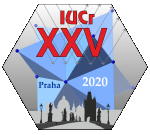Workshop on When should small molecule crystallographers publish raw diffraction data?
| Organized by | ||
| IUCr Committee on Data | ||
![[IUCr logo]](https://www.iucr.org/__data/assets/image/0007/61378/IUCr-logo-gradient-RGB.jpg) |
 |
|
Wednesday August 11 - Thursday August 12 2021
Prague, Czech Republic
A survey of the community regarding data management practices and availability of raw data in Small Molecule crystallography was conducted in 2019. We will imminently be publishing the findings in the IUCr Newsletter. As a follow-on and under the auspices of CommDat, we are holding a consultation workshop aimed at: (1) educating those who generate and deal in crystallographic data on best practices in data management; (2) understanding how to communicate those best practices to students and other novice users; (3) discussing current practices in data archival and accessibility; (4) exploring current and future use cases for archival and availability of raw data.
This workshop will be beneficial to a large number of small-molecule crystallographers and data scientists. We expect attendees to gain an appreciation of the importance of archiving raw data and an understanding of how to archive their own raw data effectively. We intend to lay the groundwork for a large-scale community driven effort to standardize small molecule raw data archival with a view to ensuring that best practice in the laboratory leads to appropriate and FAIR availability of raw data to the wider community. A key goal is to explore how to make this process seamless and integrated with current facility, research and publishing practices.
Reminder: The CommDat user forum is at https://forums.iucr.org
Programme
Times are given in Central European Time (CET) and Eastern Daylight Time (EDT) for the benefit of participants in Europe and the US East Coast.
Day 1: Wednesday 11 August | Session 1: Use cases highlighting the value of raw data management/availability in SMX |
||
| 14:00-14:10 (08:00-08:10) | Amy Sarjeant | Workshop introduction and results of the CommDat survey on data management and availability | Presentation |
| 14:10-14:35 (08:10-08:35) | Michal Dušek (Prague) | The value of the availability of raw data for (re)determining modulated/incommensurate structures | Presentation |
| 14:35-15:00 (08:35-09:00) | Kamil Dziubek (Poznan) | Using raw data to improve the interpretation of high-pressure diffraction experiments | Presentation |
| 15:00-15:25 (09:00-09:25) | Amber Thompson (Oxford) | Making a Silk Purse out of a Sow's Ear: Publishing Difficult Data | Presentation |
| 15:25-15:45 (09:25-09:45) | Coffee | ||
| 15:45-16:10 (09:45-10:10) | Simon Grabowsky (Bern) / Krzysztof Wozniak (Warsaw) | Inclusion of raw data to support validation and publication in quantum crystallography | Presentation |
| 16:10-16:35 (10:10-10:35) | Jim Britten (McMaster) | Use of raw data for diffraction space visualization | Presentation |
| 16:35-17:00 (10:35-11:00) | Joe Ferrara (Rigaku) | Instrument vendor perspective – what could be done? | |
| 17:00 (11:00) | Close of Day 1 | ||
Day 2: Thursday 12 August | |||
Session 2: What would a 'standard' look like? - best practice | |||
| 14:00-14:10 (08:00-08:10) | Simon Coles (Southampton) | Current practices in raw data archival (home laboratories) | Presentation |
| 14:10-14:35 (08:10-08:35) | Graeme Winter (Diamond) | Future outlook for a curated raw data archive | Presentation |
| 14:35-15:00 (08:35-09:00) | Loes Kroon-Batenburg (Utrecht) | How to make structures better in the future and the use of published raw data in crystallographic software development | Presentation |
| 15:00-15:20 (09:00-09:20) | Coffee | ||
| 15:20-15:45 (09:20-09:45) | Teodor Ivănoaica (Extreme Light Infrastructure) | Data Policy at Large Research Infrastructure. Data Retention challenge | Presentation |
| 15:45-16:10 (09:45-10:10) | Natalie Johnson (CCDC) | The value of integration of raw data with publishing procedures and results databases | |
| 16:35 (10:35) | Panel discussion | ||
The panel session is aimed at enabling discussion and will canvass opinions around exactly what constitutes best practice, recommendations that might be made to CommDat, when to make raw data available as part of the publication process (or when it is not necessary) and the potential for trials or pilots.
There will be a registration fee of €10 euro.


![[S.J. Coles]](https://www.iucr.org/__data/assets/image/0003/143778/coles.jpg)
![[L. Kroon-Batenburg]](https://www.iucr.org/__data/assets/image/0014/113351/loes.jpg)